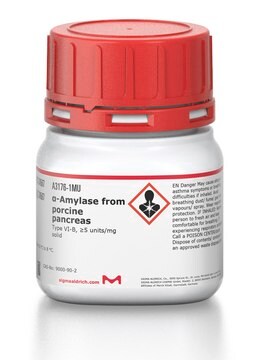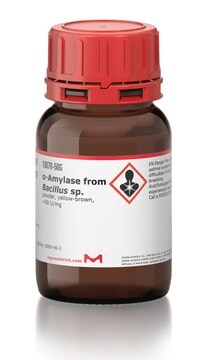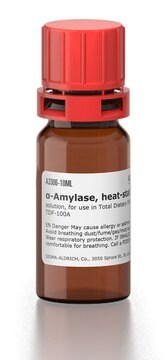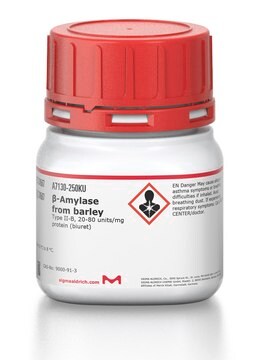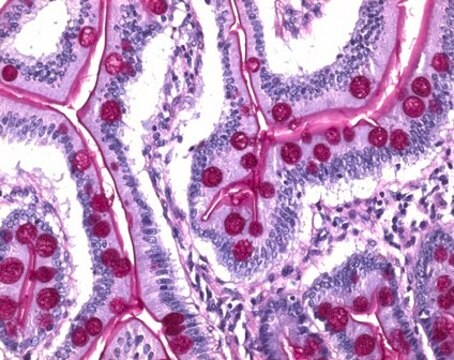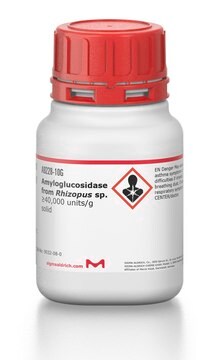09962
Diastase from Aspergillus oryzae
powder, white, amylase ≥3500 U/g
Autenticatiper visualizzare i prezzi riservati alla tua organizzazione & contrattuali
About This Item
Prodotti consigliati
Stato
powder
Livello qualitativo
amylase activity
≥3500 U/g
Colore
white
Temperatura di conservazione
2-8°C
Applicazioni
Diastase from Aspergillus oryzae has been used:
- to distinguish sulphomucins and sialomucins
- to discriminate acidic mucins from neutral mucins in the lingual salivary glands
- as a component of the BioVision amylase activity assay buffer solution for in vitro and ex vivo degradation assays
Azioni biochim/fisiol
Diastase catalyzes the digestion of glycogen. It is useful as a reducing and stabilizing agent in the aqueous synthesis of gold nanoparticles (AuNPs).
Definizione di unità
1 U corresponds to the amount of enzyme which liberates 1 μmol maltose per minute at pH 6.0 and 25 °C (starch acc. to Zulkowsky, Cat. No. 85642, as substrate)
Avvertenze
Danger
Indicazioni di pericolo
Consigli di prudenza
Classi di pericolo
Resp. Sens. 1
Codice della classe di stoccaggio
11 - Combustible Solids
Classe di pericolosità dell'acqua (WGK)
WGK 1
Punto d’infiammabilità (°F)
Not applicable
Punto d’infiammabilità (°C)
Not applicable
Dispositivi di protezione individuale
dust mask type N95 (US), Eyeshields, Faceshields, Gloves
Scegli una delle versioni più recenti:
Possiedi già questo prodotto?
I documenti relativi ai prodotti acquistati recentemente sono disponibili nell’Archivio dei documenti.
I clienti hanno visto anche
Ultrastructure of the tongue and histochemical features of the lingual salivary glands in buzzards
Bozkurt EU, et al.
Turkish Journal of Veterinary and Animal Sciences, 42, 161-167 null
Kesarla Mohan Kumar et al.
Spectrochimica acta. Part A, Molecular and biomolecular spectroscopy, 116, 539-545 (2013-08-27)
A facile rapid green eco-friendly method to synthesize gold nanoparticles (Au NPs) of tunable size using aqueous Terminalia arjuna fruit extracts has been demonstrated herein. Formation of Au NPs was confirmed by Surface Plasmon Resonance (SPR) study at 528 nm
F Başak et al.
Folia morphologica, 76(3), 348-354 (2017-02-16)
In this study, morphological characteristics of the canary tongue were examined macroscopically and histologically besides using scanning electron microscopy. Furthermore, histochemical features of the lingual salivary glands of the canary were also examined. The results suggest that the tongue of
Il team dei nostri ricercatori vanta grande esperienza in tutte le aree della ricerca quali Life Science, scienza dei materiali, sintesi chimica, cromatografia, discipline analitiche, ecc..
Contatta l'Assistenza Tecnica.
